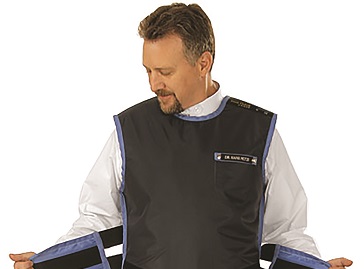Medical textiles may soon solve Indian healthcare woes
March 07, 2015 | Saturday | Features | By Aishwarya Venkatesh
Medical textiles may soon solve Indian healthcare woes
KRIDA Direct Replacement of Lead and Lead Equivalent Aprons
Located in Tirupur, India, Shakti Knitting is one of the top ranked export hub for knitted garments across the globe. After tasting success with fashion and design, the founders of Shakti Knitting, were yearning to diversify. As healthcare offered an option to both innovate and grow, the founders chose medical devices as the key area of focus and quickly formed a subsidiary, SKL Medtech. The start-up aims to provide novel healthcare solutions through medical and protective textiles.
"Growing antibiotic resistance is a global issue," said Mr Vasanth Kumar, co-founder, SKL Medtech, "Both CDC and WHO have rung alarm bells that antibiotic resistance is the biggest emerging threat to mankind. As engineers we are looking at textile-based solutions to address this issue. Utilizing our cross platform technology, we have developed two products- Theruptor, which is drug free active wound care system and Krida, which is a light weight, flexible and sterile X-Ray attenuating apparel that protects from radiation exposure to health care providers."
Theruptor facilitates wound healing without the use of any antimicrobial drug. It acts as a barrier against airborne pathogens, as well as sanitizes the wound by actively killing germs. The three dimensional structure of Theruptor enables oxygenation of the wound without allowing airborne particulates and microbes to enter the wound. The mechanism also removes the exudates continuously and evaporates it. Theruptor finds an important application in wound dressing and can be applied on wounds such as burns, diabetic, venous ulcers, trauma, incisions and skin graft and donor site.
"There are many issues in the traditional and advanced wound care methods currently followed, said Mr Kumar. These methods prevent oxygenation of the wound and allow pathogen to proliferate on the dressing thus giving rise to resistant bugs."
Co-founded by four like-minded individuals, SKL Medtech is being incubated/accelerated by Escape Velocity Accelerator. "The advanced wound care market is expected to swell to almost $8bn by 2017," said Mr Vasanth Kumar, "we at SKL discovered this market trend and have embarked on our mission to develop unique medical devices that can in a way, transform healthcare in India. Antimicrobial dressings are one of the fastest growing market segment in advanced wound care. Theruptor's addressable market includes the antimicrobial/moist sectors that make up a total $2.5bn opportunity."
Apart from Theruptor, another disruptive medical technology developed by the company is Krida that has the potential to replace lead based aprons in X-ray rooms. Explaining this unique device, Mr Kumar said, "Scattering of X-rays and eventual absorption of radiation by human body is a hazardous problem. The heavy weight of lead aprons currently used, causes discomfort to healthcare providers while performing procedures. Moreover, the aprons are not flexible and do not offer complete coverage of the body. The soiled aprons, after procedures are not easily autoclaveable. Krida is light weight, sterile and provides complete coverage of the body."
Krida provides protection for healthcare providers in the procedure room involving radiographs. The product can also used as curtains at ICUs where portable X-ray units create a lot of scattering and exposure to nearby patients. Theruptor has fared well in animal trials and has demonstrated a 40 percent faster healing capability when applied to surgical and infected animal wounds.
Confident that the new technology will create waves in the market, Mr Kumar observed, "Since there are no legally marketed predicate device cleared by the US FDA, our application in the De Novo route is being prepared and is expected to be submitted by end of this year. Our discussions with FDA representatives indicate that our applications could be moved over to Class II device following a 510 K premarket notification approval process. The approval process will take about 6 to 9 months. On successfully clearing the evaluation, we would be free to market the product with US FDA clearance."
SKL Medtech has filed for the complete patent application and PCT covering the Treaty countries. Following approval, the company is planning for a national filing for individual country such as US, UK, Europe and Japan. The company expects that the patent for the product will be granted within a year.
Krida being a disruptive technology, is set to replace the Lead Aprons and has no direct competition in its space. In the US alone, 1.5 million surgeries are being carried out using imaging techniques. "Our estimation based on a team of 4 health care givers assisting per surgery leads to a requirement of 72 million units per year on 6 month replacement cycle," added Mr Kumar.
With increased life expectancy, ageing society, evolving infections, there is a growing demand for treating diseases. The researchers' perspective towards curing and preventing ailments is changing fast with microbes developing drug resistance. Few years ago, it would have been tough to find manufacturing companies in India, embarking on the path of healthcare. However, the scenario is changing fast and nowadays healthcare and medical devices have caught the imagination of young entrepreneurs, who are designing novel products to revolutionize healthcare, in an attempt to grab a considerable portion of the market share.
Currently India does not have a major presence in the medical device market and many of the devices used in the country are imported. Rural India is a big market for any entrepreneur as it has remained untapped so far. A proper regulatory body for medical devices can help in nurturing. However, a big breakthrough that can foster the Indian medical devices industry would be bringing about a robust and efficient regulatory body.









